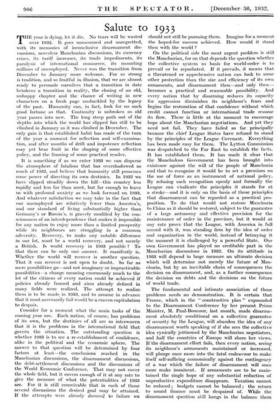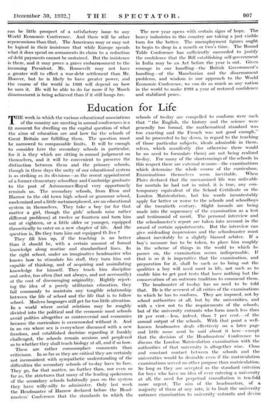Salute to. 1933
THE year is dying, let it die. No tears IA ill be wasted over 1932. It goes unmourned and unregretted, with its memories of inconclusive disarmament dis- cussions, nerveless Manchurian discussions, its currency crises, its tariff increases, its trade impediments, its paralysis of international commerce, its mounting millions of unemployed. Never was the transition from December to January more welcome. For so strong is tradition, and so fruitful in illusion, that we are almost ready to persuade ourselves that a transition in date betokens a transition in reality, the closing of an old, unhappy chapter and the chance of writing in new characters on a fresh page unshackled by the legacy of the past. Humanity can, in fact, look for no such good fortune as that. Continuity is unbroken as old year passes into new. The long steep path out of the depths into which the world has slipped has still to be climbed in January as it was climbed in December. The only gain is that established habit has made of the turn of the year a moment for reflection and self-examina- tion, and after months of drift and impotence reflection may yet bear fruit in the shaping of some effective policy, and the framing of some practical resolve.
It is something if as we enter 1933 we can disperse the atmosphere of fatalism that has overshadowed so much of 1932, and believe that humanity still possesses some power of directing its own destinies. In 1932 we have slipped steadily down the bill—this country less rapidly and less far than most, but far enough to leave us with profound anxiety as we look forward on 1933. And whatever satisfaction we may take in the fact that our unemployed are relatively fewer than America's, and our standard of living substantially higher than Germany's or Russia's, is gravely modified by the con- sciousness of an interdependence that makes it impossible for any nation to enjoy more than a limited prosperity while its neighbours are struggling in a common adversity. Recovery, to make any notable difference in our lot, must be a world recovery, and not merely a British. Is world recovery in 1933 possible ? To that there can be only one answer. It manifestly is.
Whether the world will recover is another question. That it can recover is not open to doubt. So far as mere possibilities go—and not imaginary or impracticable. possibilities—a change meaning enormously much to the lot of the citizens of every nation could be achieved if policies already framed and aims already defined in many fields were realized. The attempt to realize them is to be made in 1933, and to assume in advance that it must necessarily fail would be a craven capitulation to despair.
Consider for a moment what the main tasks of the coming year are. Each nation, of course, has problems, of its own, but the destinies of all are so interwoven that it is the problems in the international field that govern the situation. The outstanding question is whether 1933 is to see a re-establishment of confidence, alike in the political and the economic sphere. The answer to that question will be determined by four factors at least—the conclusions reached in the Manchurian discussions, the disarmament discussions, the debt-settlement discussions and ..the , discussions of the World Economic Conference. That may not cover the whole field, but it covers enough of it at any rate to give the measure of what the potentialities of 1933 are. For it is still conceivable that in each of those several discussions the desired goal may be attained. If the attempts were already doomed to failure we should not still be pursuing them. Imagine for a moment the hoped-for success achieved. How would it stand then with the world ?
On the political side the most urgent problem is still the Manchurian, for on that depends the question whether the collective system 'as basis for world-order is to prevail or be repudiated. If it prevails, it means that a threatened or apprehensive nation can look to some other protection than the size and efficiency of its own armaments, and disarmament then—and only then— becomes a practical and reasonable possibility. And every nation that by disarming reduces its capacity for aggression diminishes its neighbour's fears and begins the restoration of that confidence without which credit cannot function or international trade resume its flow. There is little at the moment to encourage hope about the Manchurian negotiations.. And yet they need not fail. They have failed so far principally because the chief League States have refused to stand by the principles of the League Covenant. Everything has been made easy for them. The Lytton Commission was despatched to the Far East to establish the facts. It has established them. It has made it clear that the Manchukuo Government has been brought into existence • against the will of the people of Manchuria and that to recognize it would be to set a premium on the use of force as an instrument of national policy. By refusing such recognition openly and formally the League can vindicate the principles it stands for at a stroke—and it is only on the basis of those principles that disarmament can be regarded as a practical pro- position. To do that would not restore Manchuria to China as it should be restored, subject to the guarantee of a large autonomy and effective provision for the maintenance of order in the province, but it would at any rate prove that the League, with America in full accord with it, was.. standing firm by the idea of order and organization in the world, instead of betraying it the moment it is challenged by a powerful State. Our own Government has played no creditable part in the Manchurian discussions in 1932. On its attitude in 1933 will depend in large measure an ultimate decision which will determine not merely the future of Man- churia, but by an inevitable chain of consequences the decision on disarmament, and, as a further consequence the decision on debts and the decisions on the future of world trade.
The fundamental and intimate association of those problems needs no demonstration. It is certain that France, which in the " constructive plan " expounded to the Disarmament Conference by her present• Prime Minister, M. Paul-Boncour, last month, made disarma- ment absolutely conditional on a collective guarantee of security by the League, will abandon the idea of any disarmament worth speaking of if she sees the collective idea cynically- jettisoned by the Manchurian negotiators, and half the countries of Europe will share her views: If the disarmament effort fails, then every nation, seeing its neighbour's armaments maintained or increased,- will plunge once more into the fatal endeavour to make itself self-sufficing economically against the contingency of a war which the failure of disarmament' will once more make imminent. If armaments are to be main- tained the single hope of any substantial reduction of unproductive expenditure disappears. Taxation cannot be reduced ; budgets cannot be balanced ; the return to sound finance must be despaired of. While the disarmament question still hangs in the balance there' can be little prospect of a satisfactory issue - to any World Economic Conference. And there will be other repercussions than that. The Americans may or may not be logical in their insistence that while Europe spends what it does spend on armaments its claim to a reduction of debt payments cannot be sustained. But the insistence is there, and it may prove a grave embarrassment to the incoming. President. Mr. Roosevelt may not have a greater will to effect a war-debt settlement than Mr. Hoover, but he is likely to have greater power, and the course of the world in 1933 will depend on how he uses it. He will be able to do far more if by March disarmament is being achieved than if it still hangs fire. The new year opens • with certain signs of hope. The heavy industries in this country are taking a just visible turn for the better. The unemployment figures ought to begin to drop in a month or two's time. The Round Table Conference has sufficiently succeeded to justify the confidence that the Bill establishing self-government in India may be an Act before the year is out. Given courage in our handling—the British Government's handling—of the Manchurian and the disarmament problems, and wisdom in our approach to the World Economic Conference, we can do as much as any nation in the world to make 1933 a year of restored confidence and stabilized peace.































 Previous page
Previous page